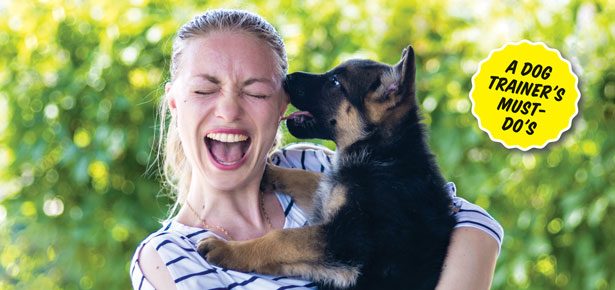

Are You the Cause of Your Dog’s Barking Problem?
What to do if you find you are at the root of your dog’s alarm barking
Q: My Miniature Poodle Daisy barks when anyone—including my husband—enters our home, but only when I’m at home. Everyone can come and go without four-alarm barking from Daisy so long as I’m out. What gives and how do I fix this?
A: By all accounts from your family and friends, your dog is an angel. She lets the cleaning lady in the house without a peep. The delivery guy drops packages at your door and never hears a sound of protest. The yard maintenance team mows the lawn and hacks away at your shrubbery while your dog monitors the progress in stalwart silence. Until you come home. Then your silent hound turns extremely vocal. Every arrival is met with a deafening round of barking. Your husband can’t even walk in the door without your dog signalling alarm.
Why does your dog bark only when you’re around? Are you causing the problem? Probably.
Ouch. If your dog is only exhibiting a behaviour when you’re present then you need to look in the mirror to find the cause. Recognizing you’re the problem isn’t always a fun realization but without facing the root cause—in this case, you—you won’t be able to find a solution.
Dogs who alarm bark only when the owner is present can be territorial and protective of those owners. Some dogs go further than barking. They will growl, snap or even bite. Your sweet fluffball snuggling next to you in bed turns into a growling menace when your spouse or significant other tries to join you. Your dog is next to you on the couch, and snaps at your friend who tries to give you a hello hug. What gives? Your dog is telling the other person to back off.
Deep down inside, if you really take a hard look at yourself, don’t you find this rather flattering? It’s hard to admit but most people get a little kick when their dog “defends” them in this manner. Even when it’s a tiny Maltese, you get a chuckle at her fierce devotion to you—there’s so much love that she would appoint herself your personal guard. This is part of the problem. You like it. And your dog knows this. Dogs are extremely perceptive. And if you’re pleased, you’re rewarding the behaviour. Your dog can sense that you are happy with her actions.
So, one of the first things you need to do is stop acting so flattered when it happens. Let your dog know that it does not make you happy. If your dog is on the couch and snaps at someone who comes near you, make her get off the couch immediately. If she’s on the bed and growls, she loses bed privileges.
This typically isn’t enough to fix the problem. You’ll need to add some counter conditioning, teaching your dog that when people come near you, it’s a good thing rather than something to be worried and upset about.
Set up some training scenarios. Every time your honey hugs you, give your dog a treat. Every time your friend hugs you, give your dog a treat. Every time the delivery service brings your food to the door, give your dog a treat. She’s going to start associating people coming near you as opportunities for delicious treats, rather than cause for alarm.
When you can’t predict someone is coming over and a guest’s arrival causes your dog to erupt in a frenzy of barking, you can still be as prepared as possible. Keep treats near the door. Before letting the person in, put your dog on leash if she is also likely to bark and lunge at them. Tether your dog to a sturdy piece of furniture, or if your house layout allows it, put her behind a baby gate. Take your time and set your dog up for success—your guest can wait an extra minute. When your dog looks at the guest, toss her a treat. With time and practice, your dog will learn to anticipate that guests mean treats, and the barking will lessen. For times when you simply can’t use a guest’s arrival as an opportunity to train your dog, then just put her out of sight. You can put her in a bedroom or crate with a stuffed food toy. This is managing the issue, not fixing it, but it’s better than letting her practice bad behaviour.
Keep in mind, the longer your dog has been practicing barking at others who approach you, the longer it may take to fix it. If it’s a new problem, you want to work on fixing it right away before it gets worse. Often what happens is that the dog practices the behaviour for a long time, and finally something happens to make you realize you really need to fix this. She may finally bite someone. Or, you may have been single and are now with a really special person, and you realize your dog needs to learn to share.
It can be hard to realize we’re the root of our dog’s problem, but there’s a certain amount of empowerment in that as well. If the problem is you, you can work to fix it! Let your dog be a loving companion, not an alarm waiting to launch. Everyone in your life will appreciate sharing you.
Is Your Dog’s Barking Actually Fear-Based?
Does your dog growl, lunge and bark at other people or dogs? Many times, people think their dogs are guarding them, when in fact that’s not the case. Much aggressive behaviour is based in fear. A fearful dog will often adopt the “best defense is a good offense” approach, making himself scary and loud so whatever’s frightening him will go away. In this case, this dog isn’t guarding you at all—he’s guarding himself.
How can you tell? Does the behaviour happen when you’re not nearby? If your dog is by himself and sees another person or dog, does he still go ballistic? Then your guard dog is protecting himself, not you. Work with a professional, reward-based trainer to help your dog learn that he’s safe and you’ll take care of him—no need for out of control barking.
Teoti Anderson, CPDT-KA, KPA-CTP, is a professional dog trainer and author of The Dog Behavior Problem Solver, Ultimate Guide to Dog Training, Puppy Care and Training, and more. She hosts the Get Pawsitive Results radio show on Pet Life Radio and educates pet parents and other trainers on canine behaviour through popular webinars and workshops.
Join the newsletter and never miss out on dog content again!
"*" indicates required fields
By clicking the arrow, you agree to our web Terms of Use and Privacy & Cookie Policy. Easy unsubscribe links are provided in every email.





